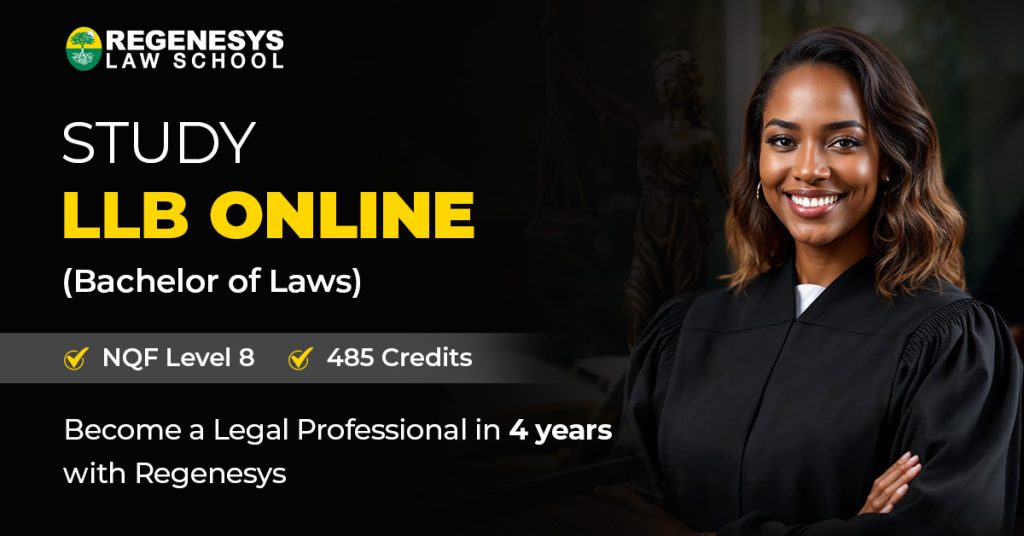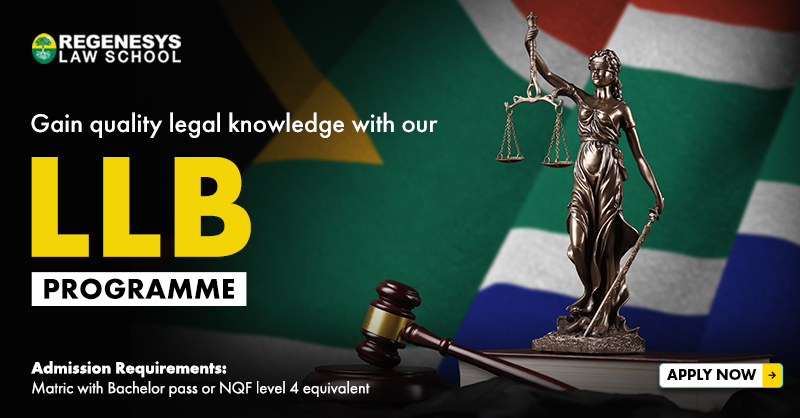A Bachelor of Laws (LLB) is the academic gateway to the legal profession in South Africa, equipping students with legal knowledge, critical reasoning, and professional ethics. South Africa’s legal landscape is evolving rapidly, influenced by technological innovation, social change, and the growing demand for accessible justice. As such, the role of legal professionals has become increasingly important in navigating complex policies, advocating for human rights, and offering legal counsel across sectors. This has made the Bachelor of Laws one of the most sought-after degrees in the country.
In this article, we will cover what an LLB programme involves, compare online and contact learning, outline LLB requirements, explore career paths, and review earning potential for lawyers in South Africa.
Table of Contents

What Is a Law Programme?
An LLB, or Bachelor of Laws, is an undergraduate qualification that prepares students to enter the legal profession in South Africa. It typically spans four years and covers foundational legal principles, South African legislation, court processes, research methodologies, and practical legal training.
The LLB is essential for anyone who wants to become an attorney, advocate, legal advisor, magistrate, or legal academic. Beyond traditional law careers, LLB graduates often work in compliance, policy analysis, international relations, and corporate governance.
At Regenesys Law School, the 4-year LLB programme is offered through contact and online learning formats, designed to suit both full-time students and working professionals. This flexibility ensures that learners can gain a solid legal foundation regardless of their personal circumstances.
The Regenesys programme is accredited by the CHE and registered with SAQA. This helps to ensure that no matter which study format students enrol in, they are guaranteed a high standard of educational experience, which we are renowned for.
Online LLB South Africa
The online LLB presents a flexible and accessible pathway for individuals seeking to pursue a legal qualification without the constraints of traditional, campus-based learning. Designed to accommodate the demands of modern life, this mode of study is particularly well-suited to working professionals, parents, and individuals residing outside major urban centres.
At Regenesys Law School, the online LLB is delivered through a blended learning model. This approach includes live interactive sessions led by experienced legal facilitators with the added facility of recorded lectures. These sessions, which may take place online or in contact mode, provide academic support, peer engagement, and practical exposure to legal concepts.
The Regenesys online LLB offers several advantages:
1. Accessible Learning Platform
The intuitive digital platform allows 24/7 access to lectures, study materials, assessments, and discussion forums from anywhere.
2. Cost-Effective Legal Education
Online learning reduces the financial burden by cutting costs associated with commuting, accommodation, and campus fees.
3. Customised Study Environment
Learners have the freedom to study in a setting that suits their needs, whether at home, in a library, or while travelling.
4. Continued Academic Support
Students benefit from regular check-ins, responsive academic guidance, and scheduled consultations with law faculty online.
5. Same Academic Quality as Contact LLB
The online LLB mirrors the accredited curriculum of the contact programme, ensuring consistent academic and professional standards.
6. Career Advancement While Studying
The flexible format enables students to pursue legal studies without interrupting their current job or career progression.

Contact LLB Classes
Contact LLB classes refer to traditional in-person learning where students attend lectures, tutorials, and assessments at our world-class Sandton campus. This method is ideal for those who benefit from structured environments and prefer an immersive learning experience. It offers face-to-face interaction with lecturers, and on-campus facilities such as parking, gym, and a cafe.
While contact learning can be demanding in terms of time and travel, it offers valuable opportunities for debate, collaboration, and networking with peers, skills that are essential for the legal profession.
Advantages of contact LLB classes at Regenesys include:
1. Structured Learning Environment
In-person classes provide a consistent academic routine, fostering discipline and regular engagement with coursework and deadlines.
2. Peer-to-Peer Engagement
Classroom interaction allows students to exchange ideas, collaborate on case studies, and build valuable critical thinking and debating skills.
3. Immediate Clarification of Legal Concepts
Face-to-face access to lecturers enables students to ask questions and receive real-time feedback on complex legal principles.
4. Use of Campus Resources
Students benefit from full access to Regenesys’ legal library, Wi-Fi-enabled study zones, academic support services, and on-site facilities.
5. Networking Opportunities
Studying on campus creates opportunities to build strong relationships with faculty, classmates, and visiting legal professionals.
6. Integration of Practical Learning
Mock trials, group projects, and live workshops are incorporated into the classroom experience, bridging theory with practical legal skills.
7. Increased Accountability
Regular attendance and class participation foster responsibility, helping students stay focused and on track academically.
8. Supportive Academic Culture
Regenesys promotes a learner-centred, ethical, and inclusive environment that supports personal development and academic success.
Read more on Exploring Regenesys Law School: A Pathway to a Legal Career here!
LLB Requirements
For anyone who is interested in pursuing a career in law, it is essential to understand the LLB requirements. These entry requirements guide aspiring lawyers in preparing for legal studies and ensuring they meet the academic and institutional standards needed to enrol in a Bachelor of Laws (LLB) programme.
To qualify for the Regenesys Bachelor of Laws, candidates need to meet the following requirements:
- Matric with Bachelor’s pass or NQF level 4 equivalent qualification
- English 1st – 50% | English 2nd – 60%
- A levels for International students (Africa)
- Higher level pass for international students 26 APS
- Competent in Mathematics, English, written and oral communication skills at NQF Level 4
- Basic computer skills, internet connection and relevant IT resources
Read more on Study Law in South Africa: Expert Guidance at the 2025 LLB Masterclass here!
Bachelor of Law Subjects
The Bachelor of Laws (LLB) degree in South Africa is a comprehensive legal qualification designed to prepare students for professional legal practice, public service, or advanced academic research. The curriculum is structured to provide both theoretical foundations and practical skills required in the legal profession.
At Regenesys Law School, the LLB programme includes core subjects as well as electives that reflect the evolving demands of the legal sector. Listed below are some core modules covered in the programme:
1. Family Law
This module explores legal relationships within families, including marriage, divorce, child custody, and maintenance. It covers both civil and customary law perspectives, ensuring students understand the diverse legal frameworks governing family life in South Africa.
2. Pillars of African Law
This subject introduces students to indigenous African legal systems, focusing on customary law principles and their integration into the formal legal framework. It highlights the importance of cultural context in South African jurisprudence.
3. Constitutional Law
A critical area of study, this module examines the structure, principles, and interpretation of the South African Constitution. It includes an analysis of the Bill of Rights, separation of powers, and constitutional remedies available to citizens.
4. Law of Succession
This module covers the legal rules governing the inheritance of assets upon death. Students study wills, intestate succession, estate planning, and the administration of deceased estates within both common and customary law systems.
5. Legal Ethics and Practice
Focusing on professional conduct and responsibility, this subject equips students with knowledge of ethical obligations, client confidentiality, conflict of interest, and the role of the Legal Practice Council. It prepares students for accountable and principled legal practice.
6. Criminal Law
This module introduces the principles of criminal liability, the classification of offences, and the elements of specific crimes. It also includes a discussion of defences, sentencing, and the broader role of criminal law in society.
Where Can Lawyers Work?
Law graduates in South Africa have diverse and dynamic career opportunities, both within the traditional legal field and in related industries. An LLB degree provides a strong foundation not only for legal practice but also for roles in corporate, governmental, and social sectors. Upon graduating from law school, students typically choose to pursue one of two professional paths: becoming an attorney or an advocate.
In South Africa, the legal profession is divided into two primary streams:
- Attorneys: Attorneys are legal practitioners who consult with clients, manage legal documentation, draft contracts, and may appear in court. After completing their LLB, aspiring attorneys must serve articles of clerkship and pass the Attorneys’ Admission Examination.
- Advocates: Advocates are litigation specialists who appear in higher courts and typically work on referrals from attorneys. To become an advocate, LLB graduates must complete pupillage and be admitted to the Bar.
Lawyers in South Africa can choose to work in:
- Private Law Firms
- Corporate Legal Departments
- Public Sector and Government
- Courts and Judiciary
- Legal Aid and NGOs
- Academia and Research
Read more on Advocate vs Attorney: Exploring The Roles, Qualifications, Salaries and More
Lawyer Salary in South Africa
With South Africa’s expanding legal and business sectors, the demand for qualified legal professionals remains stable. As law continues to intersect with technology, human rights, and regulatory compliance, the need for well-trained, adaptable lawyers is only expected to grow.
Lawyers who build their careers in corporate law, commercial litigation, intellectual property, and tax law tend to earn higher salaries than those in general practice or non-profit sectors.
According to World Salaries, the average salary for a Lawyer in South Africa is R725,700, as of June 2025. However, earnings can vary on numerous factors such as experience, size of the firm, industry, among others.

Conclusion
Choosing between an online vs contact LLB is a personal decision that should reflect your lifestyle, learning style, and long-term goals. Both modes offer quality education, practical skills, and career potential.
If you are driven to pursue justice, build a rewarding career, and gain in-depth legal knowledge, an LLB, can set you on that path. At Regenesys Law School, both study modes are supported by experienced faculty, flexible schedules, and a commitment to academic excellence. Whether you’re starting your career or making a mid-life change, the Regenesys LLB is structured to support your ambition.
Visit the Regenesys Law School website to learn more about our LLB programme and enrol in a study format that best suits your requirements.
Online vs Contact LLB Programme – FAQs
How many years to study LLB in South Africa?
The Regenesys LLB programme is designed to be completed in 4 years with full-time study.
Can I study law online in South Africa?
Yes, Regenesys Law School makes it possible to enrol for an online LLB programme, which matches the educational experience of contact classes.
What are the LLB requirements?
To enrol for the Regenesys programme, candidates must have a Matric with a Bachelor pass or an NQF level 4 equivalent qualification. They must also display competency in English and Mathematics.
What jobs can I get with a Bachelor of Laws?
You can become an attorney, advocate, legal advisor, compliance officer, magistrate, or policy analyst.
What is the average LLB salary in South Africa?
The average salary for LLB graduates in South Africa is R 318,000, according to Payscale, as of July 2025.







